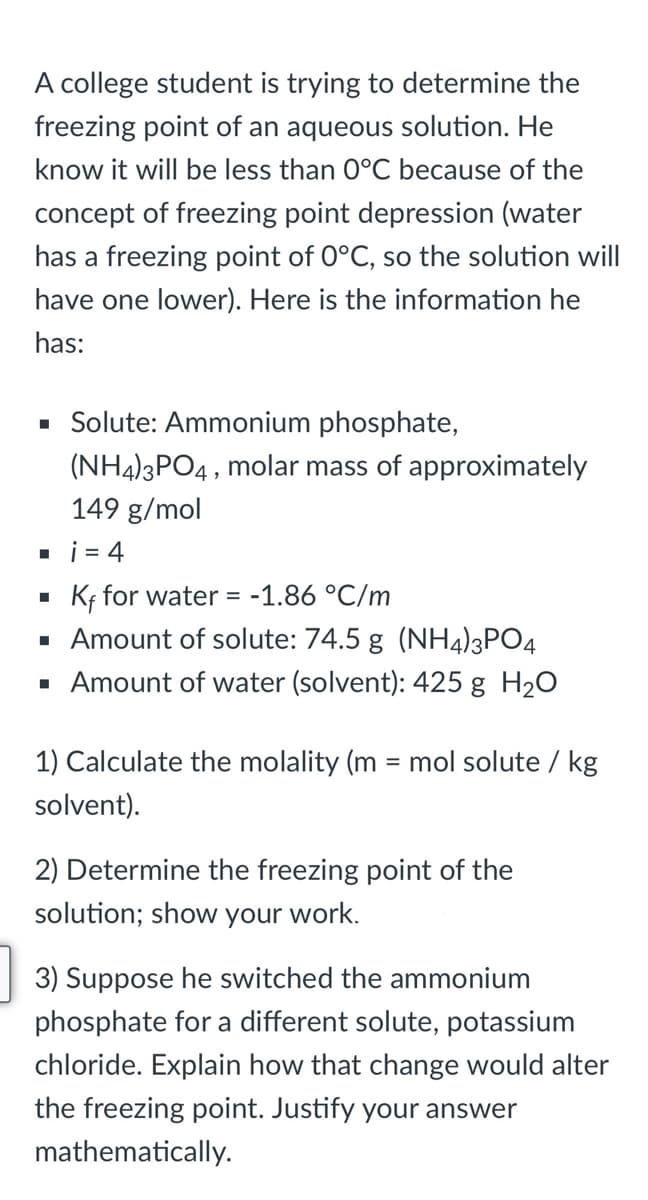A college student is trying to determine the freezing point of an aqueous solution. He know it will be less than 0°C because of the concept of freezing point depression (water has a freezing point of 0°C, so the solution will have one lower). Here is the information he has: · Solute: Ammonium phosphate, (NH4)3PO4 , molar mass of approximately 149 g/mol . i = 4 • KĘ for water = -; -1.86 °C/m · Amount of solute: 74.5 g (NH4)3PO4 · Amount of water (solvent): 425 g H20 1) Calculate the molality (m = mol solute / kg solvent). 2) Determine the freezing point of the solution; show your work. 3) Suppose he switched the ammonium phosphate for a different solute, potassium chloride. Explain how that change would alter the freezing point. Justify your answer mathematically.
A college student is trying to determine the freezing point of an aqueous solution. He know it will be less than 0°C because of the concept of freezing point depression (water has a freezing point of 0°C, so the solution will have one lower). Here is the information he has: · Solute: Ammonium phosphate, (NH4)3PO4 , molar mass of approximately 149 g/mol . i = 4 • KĘ for water = -; -1.86 °C/m · Amount of solute: 74.5 g (NH4)3PO4 · Amount of water (solvent): 425 g H20 1) Calculate the molality (m = mol solute / kg solvent). 2) Determine the freezing point of the solution; show your work. 3) Suppose he switched the ammonium phosphate for a different solute, potassium chloride. Explain how that change would alter the freezing point. Justify your answer mathematically.
Chemistry: Principles and Practice
3rd Edition
ISBN:9780534420123
Author:Daniel L. Reger, Scott R. Goode, David W. Ball, Edward Mercer
Publisher:Daniel L. Reger, Scott R. Goode, David W. Ball, Edward Mercer
Chapter12: Solutions
Section: Chapter Questions
Problem 12.95QE
Related questions
Question

Transcribed Image Text:A college student is trying to determine the
freezing point of an aqueous solution. He
know it will be less than 0°C because of the
concept of freezing point depression (water
has a freezing point of 0°C, so the solution will
have one lower). Here is the information he
has:
· Solute: Ammonium phosphate,
(NH4)3PO4, molar mass of approximately
149 g/mol
. i = 4
Kf for water = -1.86 °C/m
· Amount of solute: 74.5 g (NH4)3PO4
· Amount of water (solvent): 425 g H20
1) Calculate the molality (m = mol solute / kg
%3D
solvent).
2) Determine the freezing point of the
solution; show your work.
3) Suppose he switched the ammonium
phosphate for a different solute, potassium
chloride. Explain how that change would alter
the freezing point. Justify your answer
mathematically.
Expert Solution
This question has been solved!
Explore an expertly crafted, step-by-step solution for a thorough understanding of key concepts.
This is a popular solution!
Trending now
This is a popular solution!
Step by step
Solved in 4 steps

Knowledge Booster
Learn more about
Need a deep-dive on the concept behind this application? Look no further. Learn more about this topic, chemistry and related others by exploring similar questions and additional content below.Recommended textbooks for you

Chemistry: Principles and Practice
Chemistry
ISBN:
9780534420123
Author:
Daniel L. Reger, Scott R. Goode, David W. Ball, Edward Mercer
Publisher:
Cengage Learning

Chemistry: Principles and Reactions
Chemistry
ISBN:
9781305079373
Author:
William L. Masterton, Cecile N. Hurley
Publisher:
Cengage Learning

Chemistry: An Atoms First Approach
Chemistry
ISBN:
9781305079243
Author:
Steven S. Zumdahl, Susan A. Zumdahl
Publisher:
Cengage Learning

Chemistry: Principles and Practice
Chemistry
ISBN:
9780534420123
Author:
Daniel L. Reger, Scott R. Goode, David W. Ball, Edward Mercer
Publisher:
Cengage Learning

Chemistry: Principles and Reactions
Chemistry
ISBN:
9781305079373
Author:
William L. Masterton, Cecile N. Hurley
Publisher:
Cengage Learning

Chemistry: An Atoms First Approach
Chemistry
ISBN:
9781305079243
Author:
Steven S. Zumdahl, Susan A. Zumdahl
Publisher:
Cengage Learning


Chemistry
Chemistry
ISBN:
9781305957404
Author:
Steven S. Zumdahl, Susan A. Zumdahl, Donald J. DeCoste
Publisher:
Cengage Learning

Introduction to General, Organic and Biochemistry
Chemistry
ISBN:
9781285869759
Author:
Frederick A. Bettelheim, William H. Brown, Mary K. Campbell, Shawn O. Farrell, Omar Torres
Publisher:
Cengage Learning